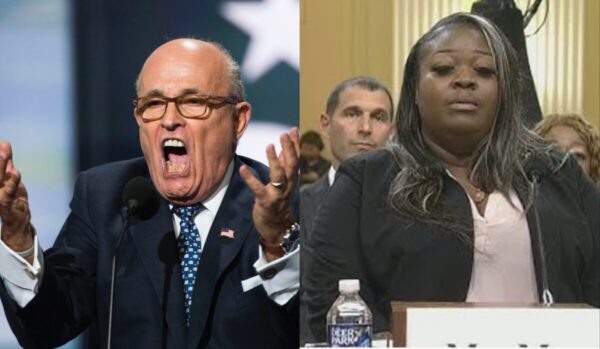Rudy Giuliani was ordered to pay $148 million in damages to a pair of Georgia election workers he defamed as part of a scheme to overturn the 2020 election, but it’s unclear whether the disgraced attorney can afford the penalty due to mounting legal bills he claims he doesn’t have the money to pay.
Some legal experts predict Ruby Freeman and Shaye Moss may ultimately receive only a small fraction of the award rather than collect a multi-million dollar payout.
“There is no way they’ll collect [the total judgment], and I don’t think they’ll collect half the amount or a quarter of the amount, just a fraction,” Ryan Goodman, a former Department of Defense special counsel, told CNN’s Erin Burnett on her show “OutFront.”

“It depends on what his assets are,” Goodman noted.
Back in August, the former New York mayor who served as the personal lawyer to President Donald Trump following the contentious election was found liable of defamation, intentional infliction of emotional distress, and civil conspiracy as part of a default judgment handed down by U.S. District Judge Beryl Howell.
At last week’s trial to determine the amount of damages, the federal jury’s verdict was Giuliani must pay $16,171,000 to Freeman for defamation, $16,998,000 to Moss for defamation, $20 million to each woman for emotional distress, and $75 million in punitive damages.
The two Black election workers came under intense public scrutiny and faced death threats after Giuliani falsely claimed they manipulated votes in metro Atlanta’s Fulton County to help Joe Biden win Georgia three years ago.
Giuliani has vowed to appeal the verdict.
“The absurdity of the number underscores the absurdity of the entire proceedings,” Giuliani told reporters after learning the judgment on Friday.
Previously, Giuliani said he was having trouble finding a lawyer to represent him due to his worsening financial situation while facing multiple lawsuits and criminal charges for his role in Trump’s alleged scheme to overturn the 2020 election results.
Throughout the trial, Giuliani and his legal team consistently emphasized his financial struggles, claiming he lacked the funds to pay off his numerous debts.
However, it’s unclear how much money the former New York mayor actually has at his disposal since he has not disclosed his latest financial statements and after he refused to cooperate with subpoenas to determine his true net worth.
At the time of Giuliani’s conviction, the 79-year-old attorney was also ordered to pay nearly $133,000 in fines for failing to turn over electronic documents and other evidence sought in the civil case against him and to cover attorneys’ fees for Moss and Freeman, which he still hasn’t paid.
Following the verdict, Giuliani and one of his lawyers met with Trump at his Mar-a-Lago estate in Florida to plead with the former president to help pay his legal bills.
Giuliani was facing outstanding debts exceeding $1 million owed to defense attorneys who assisted him in various cases, leading to several lawsuits to demand payment. Giuliani also neglected to settle several years of unpaid phone bills that amounted to nearly $60,000 in debt.
There have been a few instances when Giuliani received assistance from Republican donors to help fund his legal battles, including a separate defamation case involving the ballot technology company Smartmatic, which sued Giuliani and other Republican operatives for making false claims about its voting systems that were used during the 2020 election.
There were also signs that Giuliani did have some financial resources as he flew on a private jet when he surrendered to Georgia authorities last summer, along with Trump and 17 others, on charges of interfering in the state’s 2020 election.
In the Georgia case, Giuliani was able to get attorney Brian Tevis to represent him and help secure a $150,000 bond on Aug. 23, the day he was booked at Atlanta’s Fulton County Jail.
Elsewhere, Giuliani has been trying for months to sell his Manhattan apartment for $6.1 million, according to a public real estate listing, although no buyers have stepped up.
There’s no way Giuliani can afford to pay the entire $148 million judgment, associates of the former mayor said.
“We all know he’s not going to be able to afford that even if they garnish his wages, but it’s vindication for the plaintiffs, certainly,” Ken Frydman, who served as Giuliani’s spokesperson during his 1993 mayoral campaign, told CNN’s Jake Tapper.
It’s also uncertain whether Giuliani can file for bankruptcy to protect his assets from potential damages in the defamation case. Even if Giuliani opts for bankruptcy, there’s a possibility he could still be held responsible for the award to Moss and Freeman.
“He’s in trouble, and it’s only a question of how many assets he has,” Goodman told Burnett. “Does he have a multimillion-dollar apartment here and there? And then, it’s about them versus maybe other creditors,” he said.
Lawyers for Freeman and Moss have indicated that they will seek “every bit of money that Mr. Giuliani has available to him to pay and satisfy this judgment,” attorney John Langford said Friday.
Langford said he wanted to move quickly to finalize the judgment so that he could better pursue Giuliani’s assets.
“I want people to understand this: Money will never solve all of my problems,” Moss said outside the courthouse after the verdict on Friday. “I can never move back into the house that I called home. I will always have to be careful about where I go and who I choose to share my name with. I miss my home. I miss my neighbors and I miss my name.”


